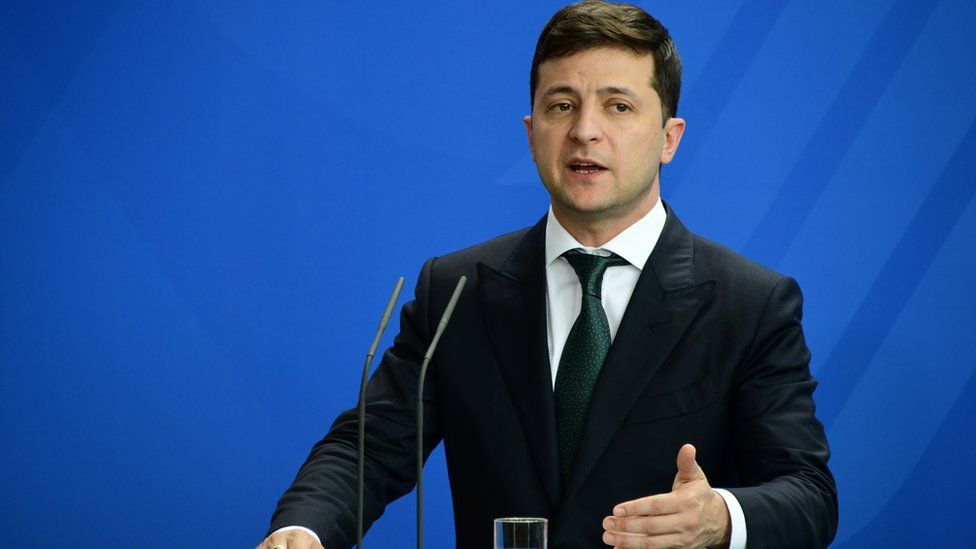Ukraine fury as Russia gets back Council of Europe voting rights
- Published

Ukraine's new president said he had tried to persuade French and German leaders to hold off on allowing Russia's return
Five years after Russia had its voting rights removed because of the annexation of Crimea from Ukraine, the Council of Europe's parliamentary assembly has voted to restore them.
The assembly backed the proposal in the face of angry opposition from Ukraine, whose delegation later walked out.
Moscow described the vote as a "victory for common sense".
Russia had threatened to abandon the 47-member human rights body, which is not linked to the EU.
Opponents say the resolution adopted in the early hours on Tuesday at the assembly's headquarters in Strasbourg is the first crack in international sanctions imposed against Russia in 2014.
But supporters say engagement with Russia will help tackle human rights abuses in Russia.
When the Russian delegation arrived on Tuesday, it was immediately challenged.
Sources said a number of members of the assembly objected to the 18-strong team presenting its credentials.
Ukraine's delegation walked out in protest and Ukrainian President Volodymyr Zelensky, sworn in last month, said he was disappointed by the decision, accusing "European partners" of not listening to his concerns.
He had discussed the issue with German Chancellor Angela Merkel and President Emmanuel Macron of France last week.
How Volodymyr Zelensky celebrated his inauguration
Russia captured 24 Ukrainian sailors last November, and Mr Zelensky said supporters of a restoration of voting rights should instead be demanding "another return".
A decision on members' objections to the resolution that allows Russia back to the assembly is expected on Wednesday, the day the council chooses its next secretary general.
Why did Russia lose its voting rights?
When Russian forces seized Ukraine's Crimea region in 2014, Russia's delegation was sanctioned by the Council of Europe's parliamentary assembly and it walked out. Russian-backed separatists have also seized areas of eastern Ukraine and are still fighting Ukrainian forces.
Russia is still a member of the Strasbourg-based Council of Europe, and Russians still have access to the European Court of Human Rights, seen as a vital recourse for citizens challenging their member state.
But in 2017 Russia stopped paying its €33m (£29m) annual contribution to the body and has recently warned it will quit the council if it is prevented from taking part in Wednesday's vote on a new secretary general.
Who was against the move?
In the vote, by 118 votes to 62, Ukraine failed in its move to stop Russia's delegation being allowed back into the chamber, supported by delegates from the UK, the Baltics and elsewhere.
Critics highlighted four names on the Russian list, external as being under European Union sanctions.
German and French delegates largely backed Russia's return, arguing it was better to have Russia inside the body than out, and also because the human rights court gave Russians a destination of "last hope".
Last week, Ukrainian Foreign Minister Pavlo Klimkin complained that it was "especially disgusting to watch some European partners actually cover their attempts to assist the Russian government with concerns about Russian civil society".
The resolution was framed in a way that did not mention Russia, external, focusing on members' rights to vote and speak, and not to have their membership suspended.
- Published22 June 2019
- Published15 November 2018